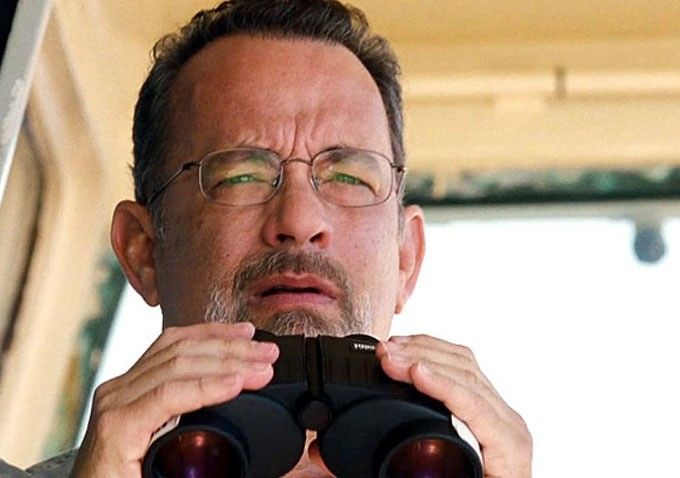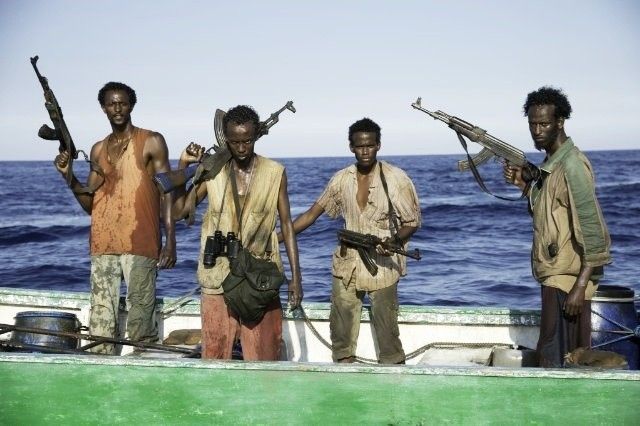Captain Phillips is this year’s Zero Dark Thirty – a mature, gritty, well-executed thriller for adults that’s also a good 20 minutes too long. The story of a real-life siege on an American cargo ship by Somali pirates, Paul Greengrass’ latest exudes the same kind intensity as his Bourne films, but it also boasts the authenticity, and perhaps more importantly, the humanity of his 9/11 film United 93.
If anything slightly too detailed in its adaptation of Captain Richard Phillips’ account of the 2009 hijacking, Greengrass’ film nevertheless manages to ratchet white-knuckle tension from events whose outcome most audiences will likely already know, creating an affecting and resonant portrait of both desperation and resilience.
Two-time Oscar winner Tom Hanks plays Phillips, a captain enlisted to shepherd the MV Maersk Alabama and its cargo to Mombasa, Kenya. When a quartet of Somalis, led by a young man named Muse (Barkhad Abdi), boards the mammoth vessel, the crew hides below deck while Phillips tries to accommodate their demands. After several crew members capture one of the pirates, they attempt to broker an exchange of hostages, but the pirates renege, taking Phillips in the lifeboat and making off for Somalia. As they race to reach the coast, the crew of the Maersk – as well as a trio of warships – follows in hot pursuit, forcing Muse to simultaneously manage his hostage and negotiate with the U.S. government, even as his fellow pirates grow worried and restless from the escalating threat of military force.
Inexplicably, Greengrass is the only filmmaker to consistently and effectively utilize his trademark handheld style – too many others, inspired by the Bourne movies, implement it indiscriminately -- but he especially maximizes its intensity here, using deliberate but unpredictable framing to create a constant state of tension. Even after the film repeatedly showcases the incompetence of the pirates, Greengrass continues to make them a palpable menace for Phillips, precisely because of their carelessness: Their ambition, and later, improvisation proves far scarier than any sort of meticulous plan might have been. But in sprinkling passing cultural truths into the highly charged life-or-death stakes of the kidnapping, the filmmaker humanizes even his antagonists, and forces audiences to recognize the dearth of options Somalis have to choose from in order to make even a fraction of what an American might earn.
As Phillips, Hanks is performing at his best, providing the resolute, unassailable calm and integrity audiences have associated with him for nearly two decades. According to a variety of online sources, the book the real Phillips wrote misrepresents how effectively he prepared the ship for attack, but Hanks, working from the “print the legend” playbook, makes the captain a case study in cool adaptability, engaging his kidnappers and weakening their defenses, not to mention secretly undermining their plans as the authorities closed in on them. If there’s an “Oscar reel” moment in the film, it comes not from one of the many standoffs, but from a scene late in the film where Phillips is being looked at by medical personnel, which Hanks imbues with such terror and vulnerability that it’s impossible not to sympathize with the character.
Conversely, the actors playing the pirates thankfully make them more than bogeymen, and particularly as Muse, Abdi wonderfully communicates the character’s fluctuating confidence, and his clear-eyed view not only of his own world, but the larger one that views him as a savage. But Greengrass’ amazing gift is to provide audiences with conventional depictions of heroes and villains, and then elevate those depictions into something substantial, and more incredibly, compassionate -- even if you occasionally find yourself ready to see a bad guy’s head get turned into pink mist.
In which case, even if the elastic suspense of the film sometimes throttles the audience into new dangers, and in others reiterates the same stakes, the cumulative impact of Captain Phillips is undeniable, and frequently overpowering. Greengrass proves once again that he is one of Hollywood’s very best filmmakers, and so it comes as little surprise that he has made one of the year’s very best films.
Captain Phillips opens today nationwide.



